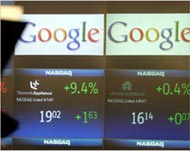Publishers, Google in copyright spat
Google Inc will be creating a digital library that will help people all over the world discover books.

Publishers and authors say the internet search engine is committing massive copyright infringement.
The argument – dubbed The Battle Over Books – was not going to be settled on Thursday night at the New York Public Library.
But the strong words traded at a panel discussion of the Google Book Search might have been a preview to an upcoming court battle.
Google is “appropriating material they don’t own for a commercial enterprise”, said Nick Taylor, president of the Author’s Guild. “However altruistic, lofty and wonderful, it’s a commercial enterprise.”
The two sides tangled for more than an hour in front of about 500 people, each trying to validate its position. And given what’s at stake, each side had plenty to say.
Google sued
Earlier this year, both the Authors Guild and the Association of American Publishers (AAP) sued Google over its book search project. The two groups claim Google is scanning copyrighted work without permission.
Under the project, millions of copyrighted books from three major university libraries – Harvard, Stanford and Michigan – will be indexed on the internet unless the copyright holder has notified Google about
 |
|
Google managers insist they are |
which volumes should be excluded.
Two other libraries, Oxford University and the New York Public Library, will contribute only out-of-copyright materials.
David Drummond, Google’s vice- president of corporate development, said there was a lot of confusion about what his company was doing in attempting to construct a huge electronic card catalogue.
Google, he said, was not trying to harm authors or publishers. When people use the Google Book Search, they will only be able to see snippets of the publication. They will not be able to read the whole book.
Fair use?
“The purpose of this programme is to help you find (books) – to help you discover them,” Drummond said. “We believe very strongly that this is fair use under copyright. This is all about discovery.”
Google’s adversaries did not accept the claim.
|
“If you controlled everything then we will get less innovation and development” |
“The court will find that it’s not in fair use,” said Allan Adler, AAP’s vice-president for legal affairs.
“Why couldn’t we license this to Google?”
Stanford law professor Lawrence Lessig said there were limits to the monopoly publishers’ and authors’ hold over their books.
“If you controlled everything, then we will get less innovation and development,” he said.
Worse yet, Lessig said, if either one of these groups settles with Google, that means the next company that comes along with a better idea will have to pay a penalty tax for being creative.
Lessig said Google’s efforts merely represented an “index for the 21st century” and those suing the company just wanted a piece of the profit pie.